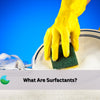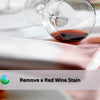Carnauba Wax for Car Care
- by Brodie Cook

From Horse Carriages to High Gloss Finishes
Back in the 1800s, people used whatever they had to keep their horse carriages looking good. That usually meant animal fat or beeswax. It added a little shine and kept the wood safe from rain and dust. But the effect wore off quickly.
In the early 1900s, cars took over from carriages. That was when a natural wax from Brazil started gaining attention. It came from the leaves of a palm tree and gave cars a deep shine that other waxes couldn’t match.
That wax was carnauba. And even though the world has moved on from carriages, carnauba is still going strong. Many still use it to keep paint looking fresh. You will even find it in our detergent sheets today.
What Is Carnauba Wax and Why Is It Good for Your Car?

Carnauba wax comes from the leaves of a palm tree called Copernicia prunifera. You’ll only find it growing in one part of Brazil where it’s hot, dry and pretty rough most of the year. To cope with the heat, the tree naturally builds up a waxy layer on its leaves to help hold in moisture and stop them drying out.
That same wax is packed with natural compounds. It’s got fatty alcohols that help it spread nice and evenly, and esters that give it that smooth, glossy finish. One of the esters is called myricyl cerotate. Bit of a technical name, but it’s a big reason the shine looks so good once it’s on your car. There’s also a mix of oils and acids that help toughen it up and make it last a bit longer.
The real difference with carnauba wax is how well it handles heat. It’s got a high melting point, somewhere around 82 to 86 degrees. This kind of durability is one of the reasons it’s still widely used in car care products, especially those made for tough Aussie conditions.
Why Is Carnauba Wax Used in Car Wash Products?
There is a reason many car lovers still choose this type of car wax. It helps water roll off the paint without leaving spots behind. Those little beads you see after a wash come from this natural wax doing its job.
The surface also looks smoother because it fills in tiny marks in the paint. That helps light bounce off evenly and gives the colour a deeper and cleaner look. It leaves behind a natural shine that stands out in the sun.
You only need a small amount to see the difference. In a car wash sheet, it mixes through the water and coats the surface as you clean. It rinses off without streaks and helps your car stay cleaner for longer.
Is Carnauba Wax Vegan? Yes, and Here’s Why
Carnauba wax comes from the leaves of a palm tree. It is completely plant-based and the tree is not harmed when the wax is collected. That makes it a great option for anyone looking to avoid animal products.
It is often compared with beeswax, which is made by bees and is not considered vegan. Beeswax is also softer and less durable, so it is not used the same way in car care.
Carnauba, on the other hand, is used in all kinds of vegan products. You will find it in makeup, food coatings and even medicine capsules. It works well, looks great and comes straight from nature. That is why it is the wax of choice for people who care about what goes into the things they use.
Carnauba Wax vs Beeswax: Which Is Better for Cars?
Both carnauba and beeswax are natural, but they are not the same when it comes to looking after your car. Carnauba wax is much harder and can handle heat much better. That makes it more reliable for use on vehicles, especially in hot or sunny weather.
Beeswax is softer and tends to melt at lower temperatures. It can be great for wood or leather, but it does not offer the same level of shine or protection for car paint. It also comes from animals, so it is not something many people choose for vegan or plant-based products.
Carnauba gives a deeper shine, lasts longer, and works better at keeping water and dirt off the surface. That is why it is used in premium car wash products and has become a favourite among car enthusiasts around the world.
| Feature | Carnauba Wax | Beeswax |
|---|---|---|
| Source | Leaves of carnauba palm | Bees (animal by-product) |
| Melting Point | 82–86°C | ~62–64°C |
| Hardness | Very hard, flake-like | Softer, tackier |
| Gloss Finish | Deep, high-gloss | Low to moderate sheen |
| Water Resistance | Excellent | Moderate |
| Common Uses | Cars, food, cosmetics | Candles, lip balms, woodwork |
How Carnauba Wax Fits into Modern Car Wash Products
Carnauba wax is no longer just found in old-school tins of paste wax. Today, it is used in all sorts of car care products. You will see it in liquid wash and wax blends, spray detailers and other quick-shine solutions. Most of these come in plastic bottles that end up in the bin after just a few uses.
That is why car wash sheets are such a smart upgrade. Each Lucent Globe sheet includes the right amount of carnauba wax to boost shine while you wash. There is no need for extra bottles, bulky containers or harsh chemicals. Just drop a sheet into water, wash your car and rinse. The wax works as you clean, leaving your paint glossy and water-repellent by the time you dry it.
It is a faster, cleaner and lighter way to wash your car. And once you see the results, it is hard to go back to anything else.
How Long Does the Shine Last of Carnauba Wax?
The effects of carnauba wax can last anywhere from two to six weeks when used in a car wash product. That will depend on a few things, like how often you wash your car and what kind of weather it is exposed to. Hot sun, salty air or heavy rain can wear it down faster.
The condition of your paint also makes a difference. If your car is already clean and smooth, the wax will stick better and stay on longer. That is why regular washing helps. Every time you use a Lucent Globe car wash sheet, you are topping up that layer of wax without even thinking about it. It is an easy way to keep your car looking fresh with very little effort.
Is Carnauba Wax Safe for All Paint Types?
Yes, carnauba wax is safe for most cars. It works well on vinyl wraps, acrylic finishes and clear coat systems. You can use it on both new and older paint jobs without any trouble.
If your car has a matte or satin finish, just take a bit more care. Carnauba adds shine, so it might leave those surfaces looking uneven or patchy. That is why it is usually best to avoid it on matte paint unless you are aiming for a bit of sheen.
It can also be used on top of ceramic coatings. Just check with your detailer first, since some coatings need special care. If it is good to go, the wax can add an extra layer of gloss and water resistance without affecting the coating underneath.
To Sum it all up: What You Get When You Use a Carnauba Wax Car Wash Sheet
Using a car wash sheet with carnauba wax is one of the simplest ways to protect your car and keep it looking fresh. Here's what you can expect every time you wash:
-
Builds a protective layer while you wash
Each wash leaves behind a light coat that acts as a barrier against road grime, dirt, and weather. -
Helps defend your paint from UV rays
The wax layer helps reduce the impact of sun exposure over time, especially in harsh Aussie conditions. -
Delivers natural protection and shine
You get a clean finish and a soft glow that brings out the colour without using harsh synthetic products. -
Perfect for regular washing, not just detailing
No need to wax your car separately. The wax is built into your wash routine. -
Reduces swirl marks and light surface scratches
The wax helps smooth out tiny imperfections and leaves the surface feeling slick. -
Safe on clear coats, wraps, and modern paint types
Formulated to work with common paint finishes without causing damage. -
No buffing needed
There’s no extra step. Just wash, rinse, and dry. The wax does the work as you go. -
Applies evenly without fuss
The wax is pre-dosed in each sheet. No need for a foam applicator or guesswork. -
Works well with a clean microfiber cloth
After rinsing, a quick dry with a soft cloth helps bring out the shine and prevents spots. -
Makes water bead and roll off
Thanks to the wax, water won’t sit on the surface. That means fewer marks and easier drying. -
Good balance of convenience and results
You get the shine of a show car without needing to spend hours detailing. -
Can be used with other synthetic products
If you use a spray wax or ceramic top coat, this won't interfere. It's safe to layer.
Common Questions about carnaiba wax with car care
Is carnauba wax biodegradable?
Yes, it is. Carnauba wax comes from a natural plant source and breaks down safely in the environment. It does not leave behind harmful residue, which is one of the reasons we chose it for our detergent sheets.
Can carnauba wax cause streaking?
No, not when used the right way. In diluted formulas like Lucent Globe car wash sheets, it spreads evenly and rinses clean. Just make sure you do not apply too much product or let water dry on the surface before you wipe it down.
Do you have any car washing tips?
Yes, we do. We created a guide with the ten most common car washing mistakes and how to avoid them. It covers things like washing in direct sunlight, skipping the drying step and using the wrong tools. You can read it here: Common Mistakes to Avoid When You Wash Your Car

 Dishwashing
Dishwashing Laundry
Laundry Bundles
Bundles Surfaces
Surfaces Toilet
Toilet Handsoap
Handsoap Multi-Purpose
Multi-Purpose Floor
Floor




